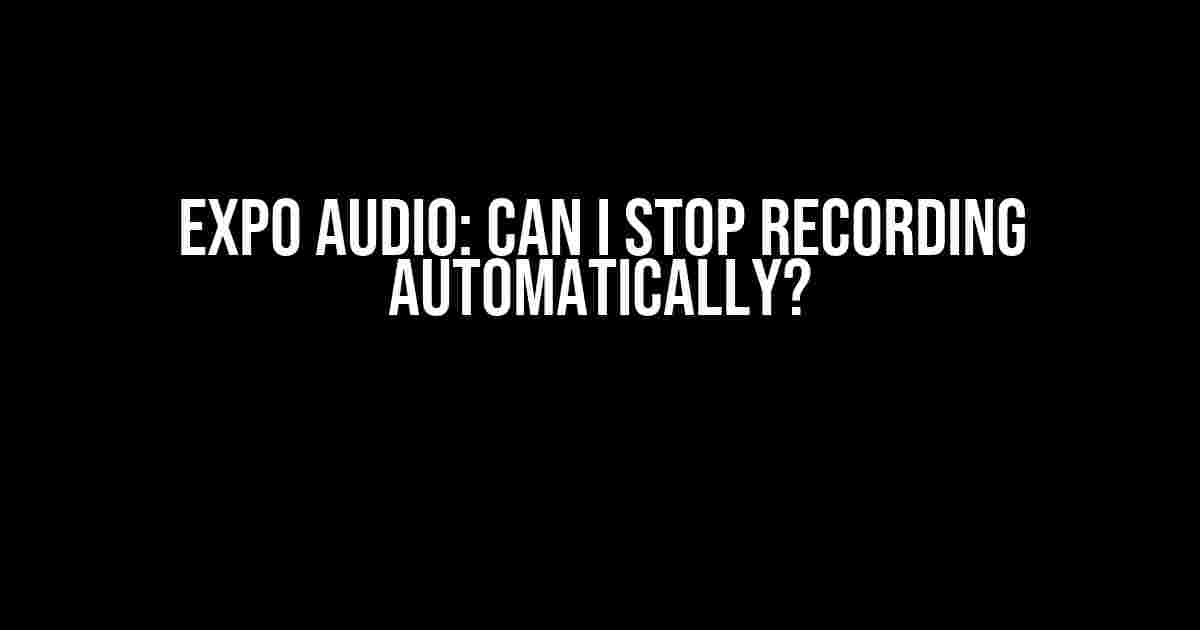As a developer, you’re probably no stranger to Expo audio and its incredible capabilities. But, have you ever found yourself wondering, “Can I stop recording automatically?” Well, wonder no more, dear developer, for today we’re going to dive into the world of Expo audio and explore the answer to this question.
What is Expo Audio?
Before we dive into the meat of the matter, let’s take a quick peek at what Expo audio is. Expo audio is a fantastic library that allows you to record and play back audio files in your Expo projects. It’s a powerful tool that enables you to create engaging audio experiences for your users. From voice notes to podcasts, Expo audio has got you covered.
Why Stop Recording Automatically?
So, why would you want to stop recording automatically? Well, there are several scenarios where this feature comes in handy:
-
You’re building a voice memo app and want to automatically stop recording when the user reaches the maximum allowed time.
-
You’re creating a podcast app and want to automatically stop recording when the user reaches the maximum allowed file size.
-
You’re building a voice assistant and want to automatically stop recording when the user stops speaking.
In each of these scenarios, automatically stopping the recording process can enhance the user experience and make your app more intuitive.
So, Can I Stop Recording Automatically?
Yes, you can! Expo audio provides a couple of ways to stop recording automatically. Let’s explore them:
Method 1: setTimeout()
One way to stop recording automatically is to use the trusty old setTimeout() function. This method is simple and effective:
import { Audio } from 'expo-av';
const recording = new Audio.Recording();
recording.prepareToRecordAsync();
setTimeout(() => {
recording.stopAndUnloadAsync();
}, 30000); // Stop recording after 30 seconds
In this example, we’re using setTimeout() to stop the recording after 30 seconds. You can adjust the time to fit your needs.
Method 2: Audio_recording.isRecording()
Another way to stop recording automatically is to use the isRecording() method provided by Expo audio. This method returns a promise that resolves to a boolean indicating whether the recording is still in progress:
import { Audio } from 'expo-av';
const recording = new Audio.Recording();
recording.prepareToRecordAsync();
const intervalId = setInterval(() => {
recording.isRecording().then(isRecording => {
if (!isRecording) {
clearInterval(intervalId);
recording.stopAndUnloadAsync();
}
});
}, 1000); // Check every 1 second
In this example, we’re using setInterval() to check every 1 second whether the recording is still in progress. If it’s not, we clear the interval and stop the recording.
Additional Tips and Tricks
Here are some additional tips and tricks to help you make the most of Expo audio’s automatic stopping feature:
| Tips and Tricks | Description |
|---|---|
| Use a debouncer | To avoid multiple stopAndUnloadAsync() calls, consider using a debouncer like lodash.debounce(). |
| Handle errors | Make sure to handle any errors that may occur during the recording process. Expo audio provides an onError callback for this purpose. |
| Use a timer | Instead of using setTimeout() or setInterval(), consider using a timer like react-native-timer. This can provide more flexibility and accuracy. |
By following these tips and tricks, you can create a seamless audio recording experience for your users.
Conclusion
In conclusion, stopping recording automatically with Expo audio is a breeze. Whether you’re building a voice memo app, a podcast app, or a voice assistant, Expo audio has got you covered. By using setTimeout() or Audio_recording.isRecording(), you can create an intuitive and user-friendly audio recording experience.
So, go ahead and get creative with Expo audio! Experiment with different methods and techniques to find what works best for your app. And remember, if you ever get stuck, the Expo audio documentation and community are just a click away.
Happy coding, and don’t forget to stop recording automatically!
Here are 5 Questions and Answers about “Expo audio: Can I stop recording automatically?” :
Frequently Asked Question
Got questions about Expo audio recording? We’ve got answers!
Can I stop Expo audio recording automatically after a certain time?
Yes, you can! Expo audio recording allows you to set a maximum recording duration. Once the set time is reached, the recording will automatically stop. Just make sure to configure the `maxDuration` option when initializing the recording.
How do I stop Expo audio recording when a certain event occurs?
You can stop Expo audio recording programmatically by calling the `stopAsync()` method when a specific event occurs. For example, you can bind the stop function to a button press or when a certain audio level is reached.
Can I stop Expo audio recording when the app is in the background?
Yes, Expo audio recording can be stopped automatically when the app is in the background. You can use Expo’s `AppState` API to detect when the app is in the background and then stop the recording.
Will Expo audio recording stop automatically when the device’s storage is full?
Yes, Expo audio recording will automatically stop when the device’s storage is full. Expo audio recording will check the available storage space before starting the recording and will stop the recording if there’s not enough space.
Can I customize the audio recording stop behavior in Expo?
Yes, you can! Expo provides various options to customize the audio recording stop behavior, such as setting a maximum file size or stopping the recording when a certain audio level is reached. Check out the Expo audio recording documentation for more details.


